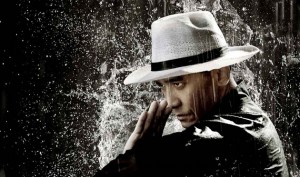Sam Ho has had a love affair with culture and the cinema of Hong Kong and China for many years – and as a top academic in the field, he found himself floored by the works of legendary director Wong Kar Wai. TOM Magazine sat down with Sam to chat about the differing styles between the two regions, how this is reflected through Wong Kar Wai’s work and why the cinema of his homeland is so essential with the threat of globalization a constant.
TOM: You’ve specialized in Hong Kong and Chinese cinema for a number of years – are there distinct differences between the two styles?
Sam: There are, there are also lots of similarities. Two different societies and cultures to begin with. Hong Kong is an extremely modernized society, very small and crowded, so it has a very distinct culture of its own. China itself is so vast and so diversified. There’s also the issue of capitalism and communism, so it all reflects in their films. It’s very interesting to me, when you look at these two cinemas, they are basically the same people with the same origin and history, with a similar cultural DNA, but they can be so different. We have just been separated for about 50 years, and the films look so much different.
TOM: When did you first come across the works of Wong Kar Wai, and why did you want to delve further into his filmography?
Sam: I came across his first film As Tears Go By and I was blown away, like most Hong Kong film critics, when he arrived on the scene. I have been a fan of Hong Kong films in the 80s, but at the time it was mostly known for its genre films, the kung-fu and ganster films. And then Wong Kar Wai came along with As Tears Go By – still a genre film, a gangster film. As a genre film you see a lot of personal touches to it and we were blown away. And of course he followed up with Days of Being Wild – that’s when I thought, ‘the master has arrived.’ I called Days of Being Wild the ultimate unfinished masterpiece of cinema.
TOM: Your lecture tonight is on tonight at the State Library – can you give me a little taste of what you’ll be discussing?
Sam: Mostly I will talk about the Chinese poetic dimension of Wong Kar Wai, and I call it mostly between Hong Kong and China, exploring the relationship between Hong Kong and China which is something that Wong Kar Wai had been dealing with from the early beginning. If you come to my lecture you will find out! But it’s especially important to discuss this issue now because in the past 15 years, after the re-unification of Hong Kong and China, the Hong Kong film industry had tried to re-integrate with China, socially and politically it had tried to re-integrate. In terms of the film industry the re-integration had brought forth a few very interesting things. For one, it had brought a lot of filmmakers’ employment, and it made a lot of people very rich as it is a bigger market, at a time when the film industry was in decline. Some people would argue that the decline was precisely because of that, because talented filmmakers went up north to work in China, but again, it is a contentious issue. This re-integration was, artistically, without much success – until Wong Kar Wai. The Grandmaster is a film that really successfully integrated Hong Kong and China.
TOM: What do you mean when you say ‘Chinese poetic sensibility’?
Sam: Good question. One reason why I use it is because Wong Kar Wai as a director and now an international figure, what has always struck people has always been his internationality. His global sensibility. For example, he will make films with a Hong Kong person in Buenos Aires, and use music from all parts of the world including South America for example, and will very beautifully and organically integrate the music of South America into the story of some Hong Kong people. In some ways Hong Kong is a very international city, very metropolitan, and working in every sector of the society. As a Chinese person, when I watch Wong Kar Wai’s work, there is something about it that touches the Chinese in me. I feel like our DNA’s align when I see his film. And I will argue that it’s his Chinese poetic sensibility. I don’t know whether Wong Kar Wai is a student of Chinese poetry, I would imagine he would be exposed to it somewhat. Chinese poetry, its formal and thematic characteristics, has found its way into his films and creative sensibilities.
TOM: In addition you’ve mentioned that Wong Kar Wai’s style is “derivative of Hong-Kong life”, but “the sense of loss that has become is signature is often evoked through a Chinese character.” Why is loss associated with the Chinese character rather than a character from Hong Kong?
Sam: Very good question. In the West, you always have traditional literature, the literature of tradition. But in China, we have that, but we also have the tradition of the ‘man of letters’, excuse the political incorrectness. One of the elements of the ‘man of letters’ is the sense of loss, because in pre-republic China, in dynastic times, people who study are of course the people of literature. The reason they study is so they can find employment. What kind of employment? Employment in the government. This is very competitive, so in other words, many of the people who study, the intellectuals, the educated sector, are not happily employed. Their lives are unfulfilled, and it’s translated into their heart. Even those people who are successful, who are able to find work in the government, are frustrated by their jobs. Even more importantly, they are frustrated by the bureaucracy. It’s built to frustrate people!
TOM: I’d like to chat a bit more about The Grandmaster – it seems like Wong Kar Wai has really taken his filmmaking to the next level.
Sam: It’s a very good film, it’s a great film, but I myself prefer a film like In The Mood For Love. In other respects, it has taken it to the next level, in the sense of integrating Hong Kong and China and the martial arts genre. It is an international genre, so it’s very interesting that something that is quintessentially Chinese, made by a director who is quintessentially Hong Kong, is in a realm that has become internationalized. The film, after it opened in Hong Kong, is being released in the West with American promotion, which is a little bit different. I haven’t seen the whole thing yet, so I am going to see the international version tonight. But still, very interestingly, I think it’s very symbolic of the global world. Global world is a bit of a contradiction, but that’s a contradiction that we have to live with! In this global world, we have a film about Hong Kong rather successfully integrating with China, that will probably be an international hit. Once again, globalisation, in all its glory, there’s always a downside. But the positive part of globalisation is that different cultures are able to connect with each other on a more direct level, while at the same time individual cultures do not lose their particular character or flavour. When globalisation first came out, despite the enthusiasm, there was the fear that America was going to take over everything. But as someone who studies culture, who loves it, I believe every individual culture has its own character that will not die. No matter how powerful this great entity called the West is, and no matter how hard it is working to dominate or change us, it will change us in some way but there will always be something essential about us, and individual culture, that will survive.
Sam Ho will be presenting a lecture at the State Library of QLD tonight the 14th of November, followed by a screening of Wong Kar Wai’s The Grandmaster. For more information visit biff.com.au




